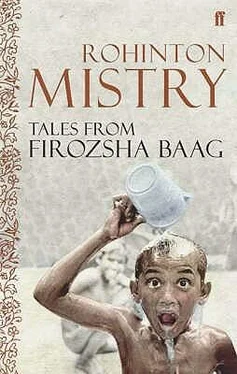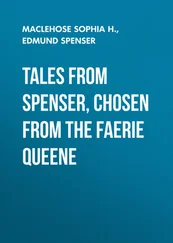Rohinton Mistry - Tales From Firozsha Baag
Здесь есть возможность читать онлайн «Rohinton Mistry - Tales From Firozsha Baag» весь текст электронной книги совершенно бесплатно (целиком полную версию без сокращений). В некоторых случаях можно слушать аудио, скачать через торрент в формате fb2 и присутствует краткое содержание. Год выпуска: 2006, Издательство: Faber & Faber, Жанр: Современная проза, на английском языке. Описание произведения, (предисловие) а так же отзывы посетителей доступны на портале библиотеки ЛибКат.
- Название:Tales From Firozsha Baag
- Автор:
- Издательство:Faber & Faber
- Жанр:
- Год:2006
- ISBN:нет данных
- Рейтинг книги:3 / 5. Голосов: 1
-
Избранное:Добавить в избранное
- Отзывы:
-
Ваша оценка:
- 60
- 1
- 2
- 3
- 4
- 5
Tales From Firozsha Baag: краткое содержание, описание и аннотация
Предлагаем к чтению аннотацию, описание, краткое содержание или предисловие (зависит от того, что написал сам автор книги «Tales From Firozsha Baag»). Если вы не нашли необходимую информацию о книге — напишите в комментариях, мы постараемся отыскать её.
Tales From Firozsha Baag — читать онлайн бесплатно полную книгу (весь текст) целиком
Ниже представлен текст книги, разбитый по страницам. Система сохранения места последней прочитанной страницы, позволяет с удобством читать онлайн бесплатно книгу «Tales From Firozsha Baag», без необходимости каждый раз заново искать на чём Вы остановились. Поставьте закладку, и сможете в любой момент перейти на страницу, на которой закончили чтение.
Интервал:
Закладка:
Each Sunday, the elimination of white hairs took longer than the last time. I’m sure Daddy noticed it too, but joked bravely that laziness was slowing me down. Percy was always excused from this task. And if I pointed it out, the answer was: your brother’s college studies are more important.
Daddy relied on my nimble fourteen-year-old fingers to uproot the signposts of mortality sprouting week after week. It was unappetizing work, combing through his hair greasy with day-old pomade, isolating the white ones, or the ones just beginning to turn — half black and half white, and somehow more repulsive. It was always difficult to decide whether to remove those or let them go till next Sunday, when the whiteness would have spread upward to their tips.
The Sunday edition of the Times Of India came with a tabloid of comics: Mandrake the Magician, The Phantom, and Maggie and Jiggs in “Bringing Up Father.” The drab yellow tablecloth looked festive with the vivid colours of the comics, as though specially decorated for Sunday. The plastic cloth smelled stale and musty. It was impossible to clean perfectly because of the floral design embossed upon its surface. The swirly grooves were ideal for trapping all kinds of dirt.
Daddy reached up to scratch a spot on his scalp. His aaah surprised me. He had taught me to be tough, always. One morning when we had come home after cricket, he told Mummy and Mamaiji , “Today my son did a brave thing, as I would have done. A powerful shot was going to the boundary, like a cannonball, and he blocked it with his bare shin.” Those were his exact words. The ball’s shiny red fury, and the audible crack — at least, I think it was audible — had sent pain racing through me that nearly made my eyes overflow. Daddy had clapped and said, “Well-fielded, sir, well-fielded.” So I waited to rub the agonized bone until attention was no longer upon me. I wish Percy had not lost interest in cricket, and had been there. My best friend, Viraf from A Block, was immensely impressed. But that was all a long time ago, many months ago, now Daddy did not take us for cricket on Sunday mornings.
I paused in my search. Daddy had found something in the classifieds and did not notice. By angling the tweezers I could aim the bulb’s light upon various spots on the Murphy Radio calendar: the edges of the picture, worn and turned inward; the threadbare loop of braid sharing the colour of rust with the rusty nail it hung by; a corroded staple clutching twelve thin strips — the perforated residue of months ripped summarily over a decade ago when their days and weeks were played out. The baby’s smile, posed with finger to chin, was all that had fully endured the years. Mummy and Daddy called it so innocent and joyous. That baby would now be the same age as me. The ragged perimeter of the patch of crumbled wall it tried to hide strayed outward from behind, forming a kind of dark and jagged halo around the baby. The picture grew less adequate, daily, as the wall kept losing plaster and the edges continued to curl and tatter.
Other calendars in the room performed similar enshroudings: the Cement Corporation skyscraper; the Lifebuoy Soap towel-wrapped woman with long black hair; the Parsi calendar, pictureless but showing the English and Parsi names for the months, and the roje in Gujarati beside each date, which Mummy and Mamaiji consulted when reciting their prayers. All these hung well past their designated time span in the world of months and years, covering up the broken promises of the Firozsha Baag building management.
“Yes, this is it,” said Daddy, tapping the paper, “get me the scissors.”
Mamaiji came out and settled in her chair on the veranda. Seated, there was no trace of the infirmity that caused her to walk doubled over. Doctors said it was due to a weak spine that could not erect against the now inordinate weight of her stomach. From photographs of Mummy’s childhood, I knew Mamaiji had been a big handsome woman, with a majestic countenance. She opened her bag of spinning things, although she had been told to rest her eyes after the recent cataract operation. Then she spied me with the tweezers.
“Sunday dawns and he makes the child do that duleendar thing again. It will only bring bad luck.” She spoke under her breath, arranging her spindle and wool; she was not looking for a direct confrontation. “Plucking out hair as if it was a slaughtered chicken. An ill-omened thing, I’m warning you, Sunday after Sunday. But no one listens. Is this anything to make a child do, he should be out playing, or learning how to do bajaar , how to bargain with butcher and bunya” She mumbled softly, to allow Daddy to pretend he hadn’t heard a thing.
I resented her speaking against Daddy and calling me a child. She twirled the spindle, drawing fibres into thread from the scrap of wool in her left hand as the spindle descended. I watched, expecting — even wishing — the thread to break. Sometimes it did, and then it seemed to me that Mamaiji was overcome with disbelief, shocked and pained that it could have happened, and I would feel sorry and rush to pick it up for her. The spindle spun to the floor this time without mishap, hanging by a fine, brand new thread. She hauled it up, winding the thread around the extended thumb and little finger of her left hand by waggling the wrist in little clockwise and counter-clockwise half-turns, while the index and middle fingers clamped tight the source: the shred of wool resembling a lock of her own hair, snow white and slightly tangled.
Mamaiji spun enough thread to keep us all in kustis . Since Grandpa’s death, she spent more and more time spinning, so that now we each had a spare kusti as well. The kustis were woven by a professional, who always praised the fine quality of the thread; and even at the fire-temple, where we untied and tied them during prayers, they earned the covetous glances of other Parsis.
I beheld the spindle and Mamaiji’s co-ordinated feats of dexterity with admiration. All spinning things entranced me. The descending spindle was like the bucket spinning down into the sacred Bhikha Behram Well to draw water for the ones like us who went there to pray on certain holy days after visiting the fire-temple. I imagined myself clinging to the base of the spindle, sinking into the dark well, confident that Mamaiji would pull me up with her waggling hand before I drowned, and praying that the thread would not break. I also liked to stare at records spinning on the old 78-rpm gramophone. There was one I was particularly fond of: its round label was the most ethereal blue I ever saw. The lettering was gold. I played this record over and over, just to watch its wonderfully soothing blue and gold rotation, and the concentric rings of the shiny black shellac, whose grooves created a spiral effect if the light was right. The gramophone cabinet’s warm smell of wood and leather seemed to fly right out of this shellacked spiral, while I sat close, my cheek against it, to feel the hum and vibration of the turntable. It was so cosy and comforting. Like missing school because of a slight cold, staying in bed all day with a book, fussed over by Mummy, eating white rice and soup made specially for me.
Daddy finished cutting out and re-reading the classified advertisement. “Yes, this is a good one. Sounds very promising.” He picked up the newspaper again, then remembered what Mamaiji had muttered, and said softly to me, “If it is so duleendar and will bring bad luck, how is it I found this? These old people —” and gave a sigh of mild exasperation. Then briskly: “Don’t stop now, this week is very important.” He continued, slapping the table merrily at each word: “Every-single-white-hair-out.”
Читать дальшеИнтервал:
Закладка:
Похожие книги на «Tales From Firozsha Baag»
Представляем Вашему вниманию похожие книги на «Tales From Firozsha Baag» списком для выбора. Мы отобрали схожую по названию и смыслу литературу в надежде предоставить читателям больше вариантов отыскать новые, интересные, ещё непрочитанные произведения.
Обсуждение, отзывы о книге «Tales From Firozsha Baag» и просто собственные мнения читателей. Оставьте ваши комментарии, напишите, что Вы думаете о произведении, его смысле или главных героях. Укажите что конкретно понравилось, а что нет, и почему Вы так считаете.












